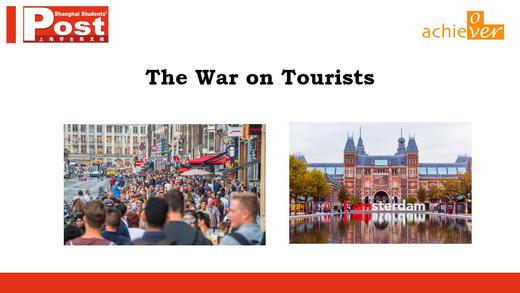《高中英语外刊阅读语篇精选》(第6辑)配套精品课

订阅专栏后播放音频

ssp


课程详情
【本课讲解文本和要点】
The War on Tourists
Outnumbered by drunk and disorderly visitors, the Dutch fight back.
• outnumber: out-number
• disorderly: dis+order+ly
① The Dutch suffered some brutal occupations, from the Roman empire and Viking raids to Spanish and Nazi rule. But now they face an even larger army of invaders: tourists.
• brutal
• occupation
• Roman empire
Ø Netherlands in the Roman era
• Viking raids
• Spanish Empire
• Nazi rule
• invader
② In the era of cheap flights and Airbnb, their numbers are staggering. Some 19 million tourists visited the Netherlands last year, more people than live there. For a country half the size of South Carolina, with one of the world’s highest population densities, that’s a lot. And according to the Netherlands Board of Tourism & Conventions, the number of annual visitors is projected to increase by 50 percent over the next decade, to 29 million. Urban planners and city officials have a word for what the Netherlands and quite a few other European countries are experiencing: overtourism. With such an influx of humanity comes a decline in quality of life. Residents’ complaints range from inconvenience (crowds spilling from sidewalks to streets) to vandalism to alcohol-induced defilement (vomiting in flower boxes, urinating in mailboxes).
• cheap flights: budget airline, low-cost airline
• population densities
• board
• is projected to
• urban planner: suburban
• quality of life
• spill
• defilement: defoul
③ Amsterdam, with its museums, guided canal tours, and picturesque architecture, sees much of this collateral damage. To combat it, the city recently passed various pieces of legislation, including a moratorium on new hotel construction in much of the city; new fines (140 euros for public urination or drunk and disorderly conduct); new restrictions on Airbnb rentals (30 nights a year per unit); and a combination of bans and restrictions on new tourist-centric businesses, such as bike-rental outfits and donut shops, in the historic city center. There’s even talk of charging day-trippers to step foot in the city, a bold policy recently enacted in Venice. Perhaps most telling, earlier this year the Dutch tourism board officially shifted its mission from “destination promotion” to “destination management.”
• guided canal tour
• picturesque
• fine
• tourist-centric business
• day-trippers
• telling: telling evidence
• destination: top vacation destination
④ Overtourism may have pierced a part of the Dutch psyche that once seemed inviolable: its gedoogcultuur, or culture of permissiveness. Ko Koens, who studies sustainable tourism at Breda University of Applied Sciences, finds the anti-tourist sentiment expressed by his fellow citizens both curious and troubling: “There’s a certain irony that many left-wing people who condemn xenophobia nonetheless talk about ‘the Chinese’ and ‘the English’ — if they’re tourists, that’s seen as okay,” Koens says.
• pierce
• psyche
• inviolable: violate
• permissiveness: permit
• sustainable: sustainability
• sentiment
• fellow
• irony
⑤ Tony Perrottet, the author of Pagan Holiday: On the Trail of Ancient Roman Tourists, says anti-tourist sentiment can be traced at least as far back as the first and second centuries A.D., when wealthy Romans visited Greece (where they complained about the food), Naples (where they complained about the guides), and Egypt (where they defaced the pyramids and the Sphinx with graffiti). “The structure of tourism historically is that you have resentful locals, and rich, unpleasant, clueless intruders: the Greeks and the Romans, the Brits and the Americans, the Dutch and Germans,” says Perrottet, who lives in Manhattan. “But I sympathize with the Dutch. God, there’s nothing more annoying than getting stuck on Fifth Avenue between a bunch of tourists.”
• be traced back
• resentful
• clueless
• sympathize